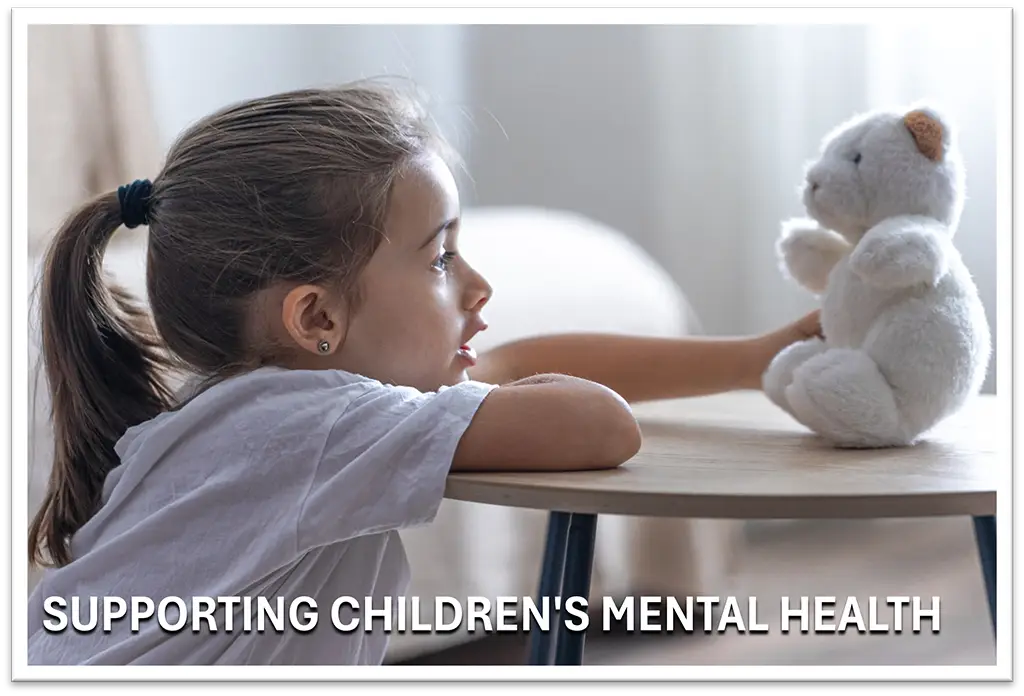Supporting Your Child’s Mental Health: Signs & Strategies for Parents

As a parent, spotting the early signs of anxiety or depression in your child can feel overwhelming. The good news: you’re in a unique position to support them — with care, curiosity and connection. Here’s a concise guide to what to watch for, and what you can do around sleep, food and friendship to keep your child’s wellbeing on track.
What to look out for
Anxiety and depression in children can sometimes show up as changes rather than dramatic events. Some possible signs to look out for include:
- Persistent low mood, irritability or tearfulness (rather than the usual ups and downs).
- Frequent physical complaints (headaches, stomach aches) without clear medical cause.
- Loss of interest in activities they used to enjoy.
- Changes in sleep or appetite.
- Difficulty concentrating, or a drop in school performance.
- Withdrawal from friends or family, or conversely extreme clinginess.
- Over-worrying, reassurance seeking, constant fear of making mistakes or fears about the future.
- Expressions of worthlessness, hopelessness or “I’m no good” thoughts (even if voiced indirectly).
Research via the The Kids Research Institute Australia’s “Healing Kids, Healing Families” program emphasises how trauma and adverse experiences can impact children’s mental health and wellbeing. And other studies show that many mental-health challenges start early — meaning your attentiveness can make a big difference.
If you observe several of these signs lasting for weeks (rather than just a few off days) it’s worth reaching out for help — to your GP or a psychologist.
Sleep: Why it matters & how you can help
Why sleep is important: Poor or irregular sleep is strongly linked with anxiety and low mood in kids and teens. When children don’t get enough restful sleep, their emotional regulation, concentration and resilience take a hit.
What to do to promote mental health:
- Set a consistent bedtime and wake-up time, even on weekends. It helps stabilise mood and energy.
- Create a “screen-off time” before bed (30-60 mins) — lights, phone, tablets off — this helps the brain wind down.
- Encourage calm, soothing routines: reading, gentle chat, soft music rather than high-stimulus gaming or social media.
- Make sure the sleep environment is comfortable: cool, dark, quiet and free of distractions. Also add in anything that helps your child sleep better; you can brainstorm this with them too.
- If your child reports persistent nightmares, frequent wake-ups or fears about going to sleep, ask them what’s on their mind. Sometimes anxiety affects sleep patterns.
Food & activity: Building resilience through body-health

Why it matters: What your child eats, how much movement they get and how they use devices all influence mental wellbeing. The more inactive, restless or isolated a young person becomes, the more risk they carry for mood and anxiety issues (Teychenne, Costigan, & Barnett, 2015).
What to do:
- Encourage regular meals and snacks — skipping meals or eating mostly processed, sugary foods can worsen mood swings or fatigue.
- Promote physical activity: walking, sport, dancing, anything that gets their body moving and their heart rate up. Even 30 mins helps.
- Limit sedentary screen time, especially close to bedtime — reduced movement and increased screen/stimulus load can increase anxiety.
- Educate them on food.
- Model healthy habits yourself: children often imitate how you manage food, movement and rest.
- Talk about food and body in positive ways — not just “eat this to feel better” but “this is one way we look after our mood and energy”.
Friendship & connection: The social pillar

Why it matters: Feeling connected matters. When kids feel lonely, excluded or under pressure socially, it can be a trigger for anxiety or depressive feelings. Supportive friendships and family bonds act as protective factors for mental health.
What to do:
- Encourage your child to spend time with friends (in person or safely online) and to talk about how those interactions feel: “Did you enjoy it? Is there anything that doesn’t feel right? How did you feel afterwards?”
- Pay attention if they withdraw socially, or frequently complain about “no one wants to hang out”. Ask gently: what do they mean and what’s behind it?
- Support them in building friend-skills: listening, sharing, saying no to things they’re uncomfortable with, asking for help when peer dynamics get tricky.
- Foster family connection: regular meals together, check-in chats, relaxed outings — these build security and help a child feel “seen”.
- Help them reflect: “What kind of friend makes you feel good? What kinds of relationships drain you?” Equipping your child to understand their social energy supports emotional health.
Final thoughts
You don’t need to be a mental-health expert to make a difference. Your openness, consistency and willingness to listen matter a lot. If you notice signs of anxiety or depression in your child, you’re not alone — and early support often leads to better outcomes.
Finally, remind your child (and yourself): it’s okay not to feel okay sometimes. What matters is not staying stuck in those feelings, but having care, connection and action when you need it.
Blog written by Maryam Qureshi
ALL Images Courtesy of FREEP!K
If you’d like to find out more about One Central Health, give us a call today on (08) 9344 1318.
